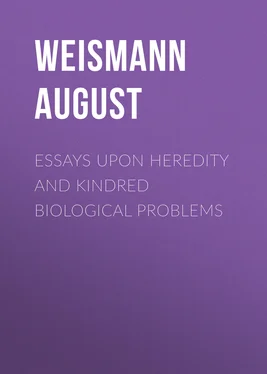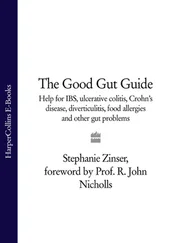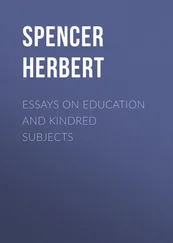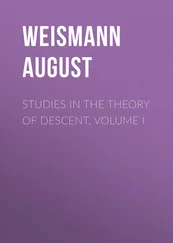August Weismann - Essays Upon Heredity and Kindred Biological Problems
Здесь есть возможность читать онлайн «August Weismann - Essays Upon Heredity and Kindred Biological Problems» — ознакомительный отрывок электронной книги совершенно бесплатно, а после прочтения отрывка купить полную версию. В некоторых случаях можно слушать аудио, скачать через торрент в формате fb2 и присутствует краткое содержание. Жанр: foreign_antique, Биология, на английском языке. Описание произведения, (предисловие) а так же отзывы посетителей доступны на портале библиотеки ЛибКат.
- Название:Essays Upon Heredity and Kindred Biological Problems
- Автор:
- Жанр:
- Год:неизвестен
- ISBN:нет данных
- Рейтинг книги:5 / 5. Голосов: 1
-
Избранное:Добавить в избранное
- Отзывы:
-
Ваша оценка:
- 100
- 1
- 2
- 3
- 4
- 5
Essays Upon Heredity and Kindred Biological Problems: краткое содержание, описание и аннотация
Предлагаем к чтению аннотацию, описание, краткое содержание или предисловие (зависит от того, что написал сам автор книги «Essays Upon Heredity and Kindred Biological Problems»). Если вы не нашли необходимую информацию о книге — напишите в комментариях, мы постараемся отыскать её.
Essays Upon Heredity and Kindred Biological Problems — читать онлайн ознакомительный отрывок
Ниже представлен текст книги, разбитый по страницам. Система сохранения места последней прочитанной страницы, позволяет с удобством читать онлайн бесплатно книгу «Essays Upon Heredity and Kindred Biological Problems», без необходимости каждый раз заново искать на чём Вы остановились. Поставьте закладку, и сможете в любой момент перейти на страницу, на которой закончили чтение.
Интервал:
Закладка:
It must be admitted that there are cases, such as the climatic varieties of certain butterflies, which raise some difficulties against this explanation. I myself, some years ago, experimentally investigated one such case 55, and even now I cannot explain the facts otherwise than by supposing the passive acquisition of characters produced by the direct influence of climate.
It must be remembered, however, that my experiments, which have been repeated upon several American species by H. W. Edwards, with results confirmatory of my own in all essential respects, were not undertaken with the object of investigating the question from this point of view alone. New experiments, under varying conditions, will be necessary to afford the true explanation of this aspect of the question; and I have already begun to undertake them.
Leaving on one side, for the moment, these doubtful, and insufficiently investigated cases, we may still maintain that the assumption that changes induced by external conditions in the organism as a whole, are communicated to the germ-cells after the manner indicated in Darwin’s hypothesis of pangenesis,—is wholly unnecessary for the explanation of these phenomena. Still we cannot exclude the possibility of such a transmission occasionally occurring, for, even if the greater part of the effects must be attributed to natural selection, there might be a smaller part in certain cases which depends on this exceptional factor.
A complete and satisfactory refutation of such an opinion cannot be brought forward at present: we can only point out that such an assumption introduces new and entirely obscure forces, and that innumerable cases exist in which we can certainly exclude all assistance from the transmission of acquired characters. In most cases of variation in colour we have no explanation but the survival of the fittest 56, and the same holds good for all changes of form which cannot be influenced by the will of the animal. Very numerous adaptations, such, for instance, as occur in the eggs of animals,—the markings, and appendages which conceal them from enemies, the complex coverings which prevent them from drying up or protect them from the injurious influence of cold,—must have all arisen entirely independently of any expression of will, or of any conscious or unconscious action on the part of the animals. I will not mention here the case of plants, which as every one knows are unconscious, for they are beyond my province. In this matter, there can be no suggestion of adaptation depending upon a struggle between the various parts of the organism (Roux) 57. Natural selection cannot operate upon the different epithelial cells which secrete the egg-shell of Apus , since it is of no consequence to the animal which secretes the egg-shell whether a good or a bad shell is produced. Natural selection first operates among the offspring, and the egg with a shell incapable of resisting cold or drought is destroyed. The different cells of the same individual are not selected, but the different individuals themselves.
In all such cases we have no explanation except the operation of natural selection, and if we cannot accept this, we may as well abandon any attempt at a natural explanation. But, in my opinion, there is no reason why natural selection should be considered inadequate to the task. It is true that the objection has been lately urged, that it is inconceivable that all the wonderful adaptations of the organism to its surroundings can have arisen through the selection of individuals; and that for this purpose an infinite number of individuals and infinite time would be required; and stress is laid upon the fact that the wished-for useful changes can only arise singly and very rarely among a great number of individuals.
This last objection to the modern conception of natural selection has apparently some weight, for, as a matter of fact, useful variations of a conspicuous kind seldom appear, and are often entirely absent for many generations. If we expect to find that qualitative changes take place by sudden leaps, we can never escape this difficulty. But, I think, we must not look for conspicuous variations—such as occur among domesticated animals and plants—in the process of the evolution of species as it goes on in nature. Natural selection does not deal with qualitative but quantitative changes in the individual, and the latter are always present.
A simple example will make this clearer. Let us suppose that it was advantageous to some species—for instance the ancestors of the giraffe—to lengthen some part of the body, such as the neck: this result could be obtained in a relatively short time, for the members of the species already possessed necks of varying length, and the variations which form the material for natural selection were already in existence. Now all the organs of every species vary in size, and any one of them will undergo constant and progressive increase, as soon as it acquires exceptional usefulness. But not only will the organ fluctuate as a whole, but also the parts composing it will become larger or smaller under given conditions, will increase or diminish by the operation of natural selection. I believe that qualitative variations always depend upon differences in the size and number of the component parts of the whole. A skin appears to be naked, when it is really covered with a number of small fine hairs: if these grow larger and increase in number, a thick covering is formed, and we say that the skin is woolly or furry. In the same way the skin of many worms and Crustacea is apparently colourless, but the microscope reveals the presence of a number of beautiful pigment spots; and not until these have increased enormously does the skin appear coloured to the naked eye. The presence or absence of colour and its quality when present are here dependent upon the quantity of the most minute particles, and on the distance at which the object in question is observed. Again, the first appearance of colour, or the change from a green to a yellow or red colour depends upon slight variations in the position or in the number of the oxygen atoms which enter into the chemical combination in question. Fluctuations in the chemical composition of the molecules of a unicellular organism (for example) must continually arise, just as fluctuations are always occurring in the number of pigment granules in a certain cell, or in the number of pigment cells in a certain region of the body, or even in the size of the various parts of the body.
All these quantitative relations are exposed to individual fluctuations in every species; and natural selection can strengthen the fluctuations of any part, and thus cause it to develope further in any given direction.
From this point of view, it becomes less astonishing and less inconceivable that organisms adapt themselves—as we see that they obviously do—in all their parts to any condition of existence, and that they behave like a plastic mass which can be moulded into almost any imaginable form in the course of time.
If we ask in what lies the cause of this variability, the answer must undoubtedly be that it lies in the germ-cells. From the moment when the phenomena which precede segmentation commence in the egg, the exact kind of organism which will be developed is already determined—whether it will be larger or smaller, more like its father or its mother, which of its parts will resemble the one and which the other, even to the minutest detail. In spite of this, there still remains a certain scope for the influence of external conditions upon the organism. But this scope is limited, and forms but a small area round the fixed central point which is determined by heredity. Abundant nourishment can make the body large and strong, but can never make a giant out of the germ-cell destined to become a dwarf. Unhealthy sedentary habits or insufficient nourishment makes the factory-hand pale and stunted; life on board ship, with plenty of exercise and sea air, gives the sailor bodily strength and a tanned skin; but when once the resemblance to father or mother, or to both, is established in the germ-cell it can never be effaced, let the habit of life be what it will.
Читать дальшеИнтервал:
Закладка:
Похожие книги на «Essays Upon Heredity and Kindred Biological Problems»
Представляем Вашему вниманию похожие книги на «Essays Upon Heredity and Kindred Biological Problems» списком для выбора. Мы отобрали схожую по названию и смыслу литературу в надежде предоставить читателям больше вариантов отыскать новые, интересные, ещё непрочитанные произведения.
Обсуждение, отзывы о книге «Essays Upon Heredity and Kindred Biological Problems» и просто собственные мнения читателей. Оставьте ваши комментарии, напишите, что Вы думаете о произведении, его смысле или главных героях. Укажите что конкретно понравилось, а что нет, и почему Вы так считаете.












